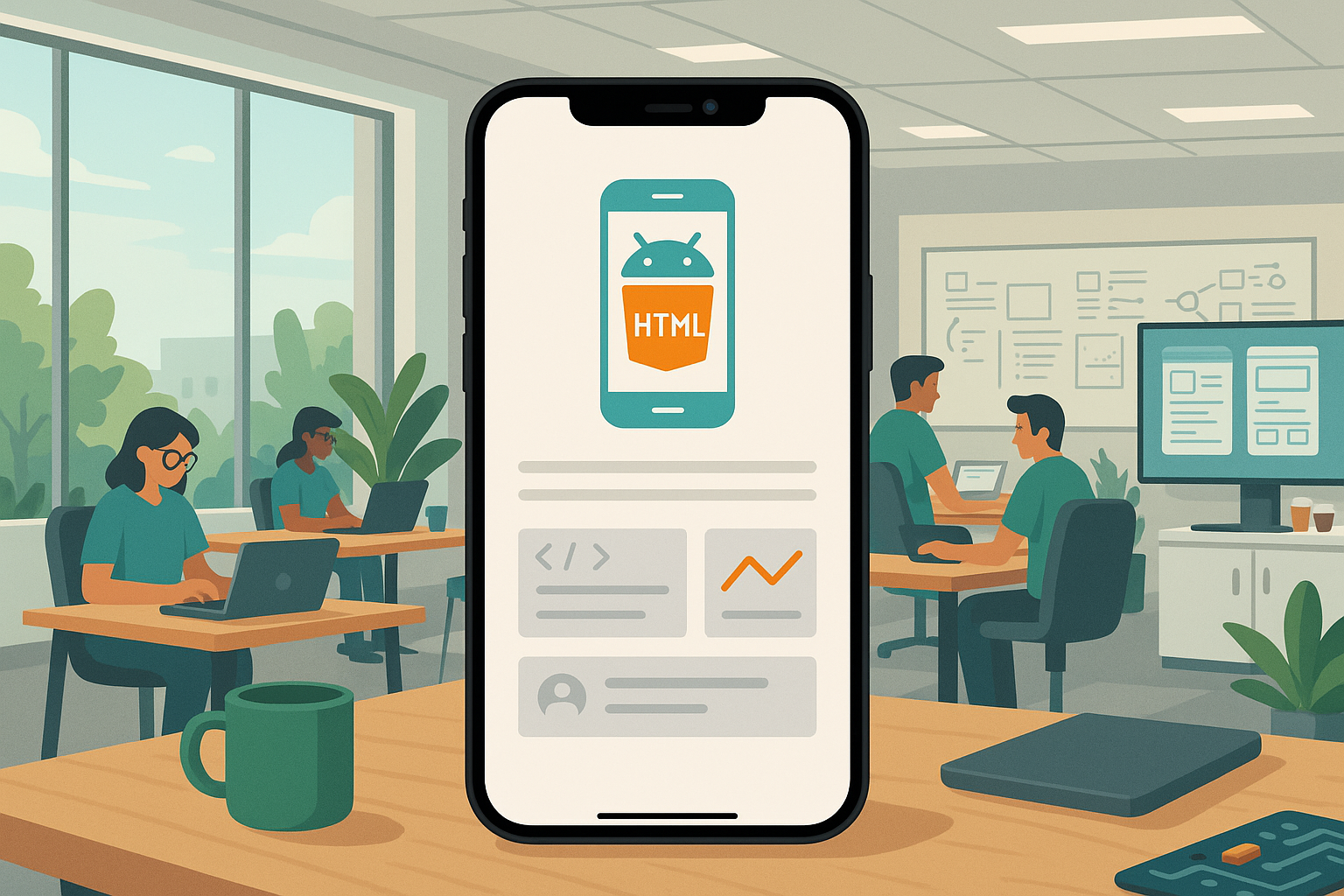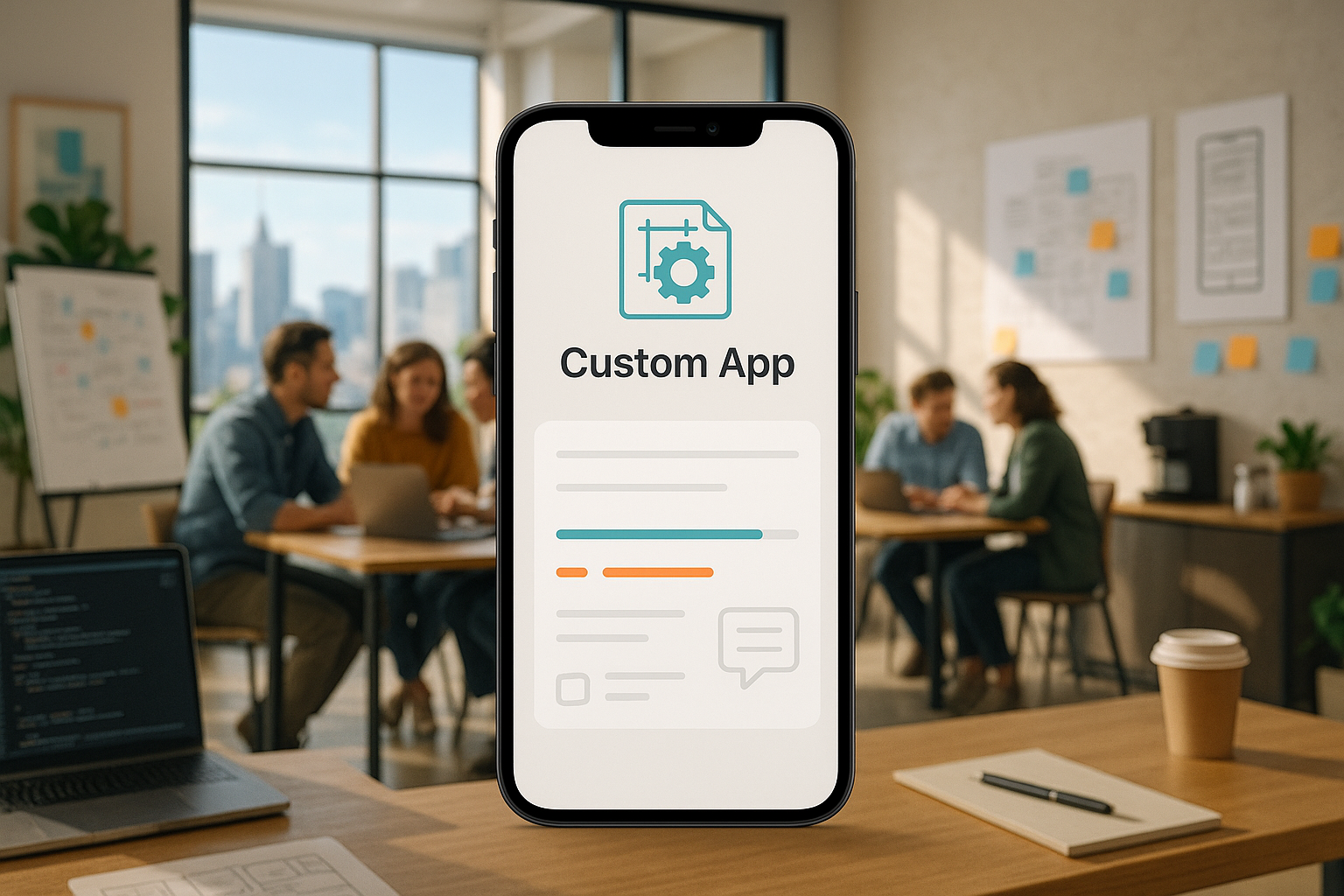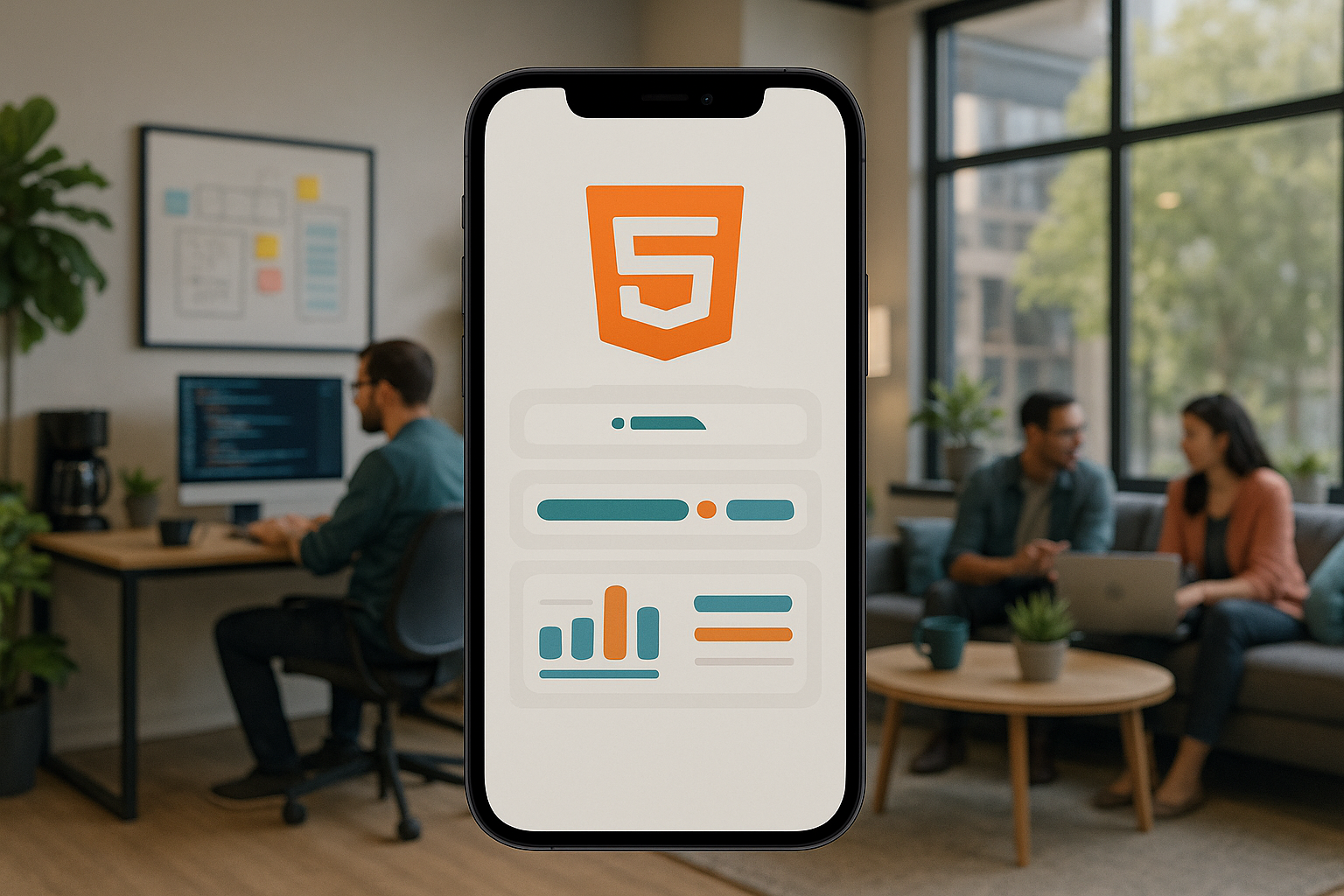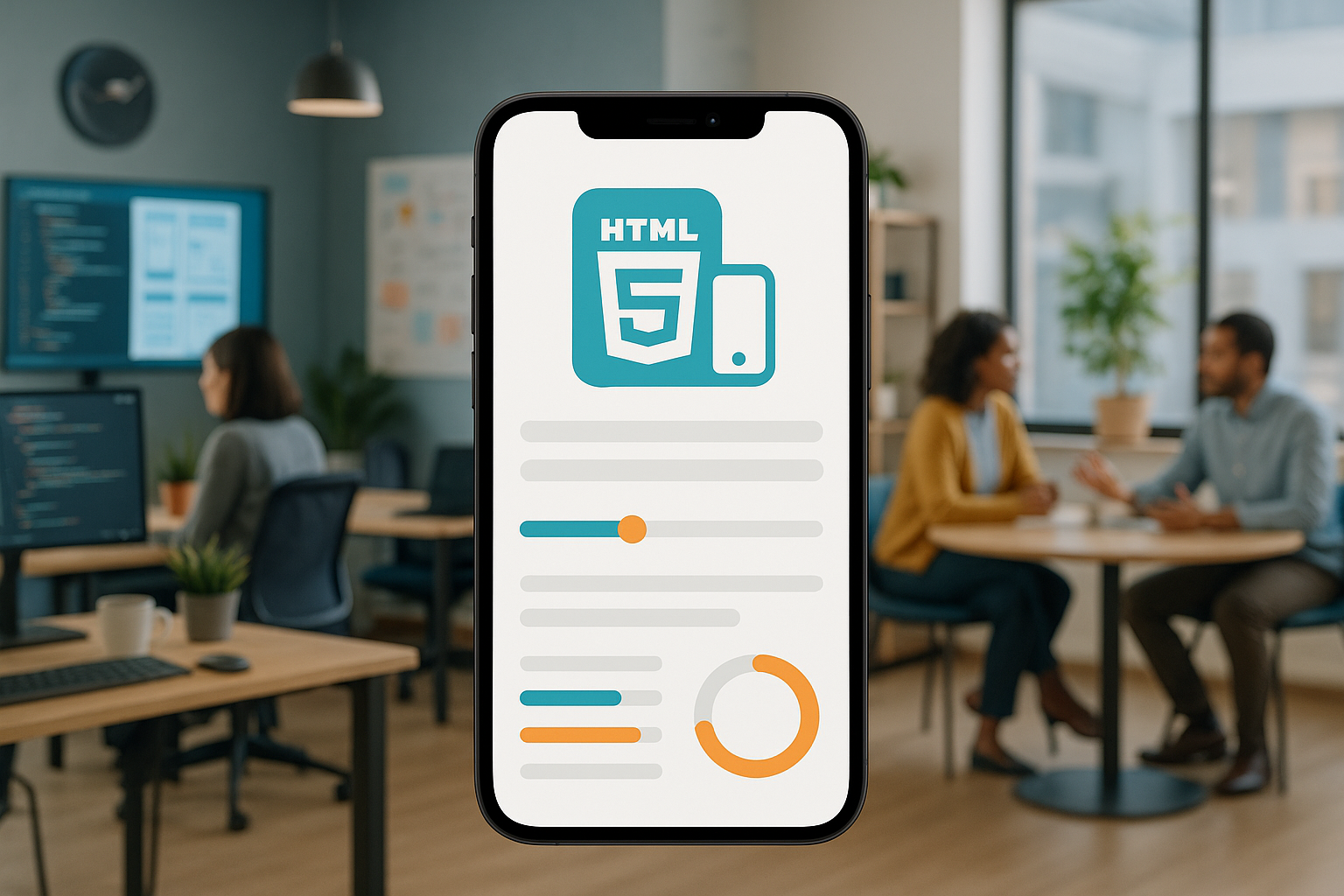Introduction
Leveraging existing web technologies to create a mobile presence is a strategic goal for countless businesses. The idea of using your established HTML5 codebase to build an Android app seems efficient and cost-effective. Yet, the path from a web property to a high-performing, engaging mobile application is fraught with complexities. Many teams underestimate the nuances of performance optimization, native feature integration, and creating a user experience that feels intuitive on a mobile device, not just like a website confined to a smaller screen. The result can be a clunky, underperforming app that fails to capture users and achieve business objectives.
This article serves as a comprehensive guide to navigating the world of custom HTML5 Android app development. We will demystify what an HTML5 Android app is, explore the significant challenges of attempting this journey in-house, and articulate the compelling case for a custom development approach. Furthermore, we will delve into cost estimates and identify leading companies that can transform your web assets into a successful mobile application.
Specifically, we will highlight how our team at MetaCTO, a top US-based AI-powered app development firm, provides the strategic guidance and technical expertise necessary to overcome these hurdles. With over 100 successful app launches, we understand what it takes to build fast, secure, and high-performing mobile apps that stand out. We don’t just write code; we partner with you to build, grow, and monetize your application, ensuring your big idea becomes a real-world success.
What is an HTML5 Android App?
An HTML5 Android app is a type of hybrid application built using standard web technologies—HTML5, CSS, and JavaScript—and then packaged into a native Android container. Unlike fully native apps, which are written in platform-specific languages like Kotlin or Java, HTML5 apps leverage frameworks that allow a single web codebase to be deployed on multiple platforms, including Android.
This approach centers on the principle of code reusability. Frameworks such as Ionic, Flutter, and Cordova enable developers to reuse significant portions of functionality from an existing website to create a cross-platform mobile app. Instead of starting from scratch, developers can adapt and tweak the existing web user experience to fit the mobile context. This ability to repurpose code and UI elements is a primary driver of efficiency, as it significantly saves development time compared to building separate native apps for each platform.
There are two primary ways this is achieved:
- True Hybrid Frameworks: These frameworks provide a bridge that allows the web code to interact with native device APIs. The app runs within a native “webview”—an isolated browser instance within the app—but has access to features like the camera, GPS, and push notifications through a layer of plugins.
- Webview Wrappers: A simpler approach involves creating a basic native Android app that consists almost entirely of a webview. This webview acts as a live window, displaying the existing, mobile-responsive website directly within the app. Solutions like MobiLoud use this method to convert a website into a fully-functional mobile app that can offer more than 90% of the functionality of a native app, simply by rendering the live web content.
The core advantage of both methods is speed. By leveraging existing assets and cross-platform frameworks, the time required to build and launch an app is drastically reduced. This makes HTML5 Android apps an attractive option for businesses looking to get to market quickly and efficiently.
Reasons It Is Difficult to Develop an HTML5 Android App In-House
While the concept of reusing web code for a mobile app sounds straightforward, the in-house execution is often challenging. Internal teams, even those proficient in web development, frequently encounter significant roadblocks that can compromise the final product’s quality and success. Hiring an expert agency helps overcome these hurdles.
Achieving a Truly Native User Experience
One of the most significant challenges is making a web-based app feel native. Users have high expectations for mobile app performance and design. They expect smooth animations, instant responses to touch gestures, and adherence to Android’s specific design conventions (like the back button, navigation drawers, and material design principles). Simply placing a website into a container often results in a subpar experience. It may feel sluggish, navigation can be unintuitive, and it can lack the polished feel of a native application. Expert agencies have dedicated UI/UX designers who specialize in tweaking and adapting web experiences to fit the mobile paradigm, ensuring the final product is both functional and delightful to use.
Performance Optimization
Webviews are powerful, but they are not as performant as native UI components. An in-house team may struggle with optimizing an HTML5 app for speed, memory usage, and battery consumption on a wide range of Android devices. Issues like slow load times, choppy scrolling, and input lag can frustrate users and lead to uninstalls. A specialized development company has the experience to identify performance bottlenecks, optimize code for mobile execution, and implement best practices that ensure the app runs smoothly, even on lower-end devices.
Complex Native Feature Integration
While hybrid frameworks provide access to native device features, implementing them is not always a simple plug-and-play process. Integrating push notifications, accessing the device’s camera or file system, or leveraging biometric authentication requires deep knowledge of both the hybrid framework and the underlying native Android platform. In-house teams can spend countless hours wrestling with plugin compatibility, permissions, and platform-specific quirks. We at MetaCTO have the experience to seamlessly integrate these complex features, ensuring they work reliably and securely.
Navigating the App Store Submission Process
Getting an app published on the Google Play Store is a complex process in itself. It involves creating developer accounts, generating signing keys, preparing store listings with appropriate assets, and adhering to an ever-changing set of policies and guidelines. A single mistake can lead to rejection and significant delays. The fact that services exist specifically to cover testing and submission underscores this complexity. An experienced agency has navigated this process hundreds of times and can manage the entire submission, ensuring a smooth and successful launch.
Post-Launch Strategy and Growth
Building the app is only the first step. True success comes from user acquisition, engagement, retention, and monetization. Most in-house development teams are focused on the technical build, not the business strategy that follows. This is where we excel. Our services extend far beyond the initial launch. We offer App Growth and Monetization services to ensure your app attracts users and generates revenue. We helped G-Sight turn one-time sales into recurring subscription revenue and assisted Mamazen in generating over $500k in annual subscriptions. This strategic, long-term partnership is something an in-house team is typically not equipped to provide.
Why Custom App Development for HTML5 Android
Opting for custom app development with an experienced partner like MetaCTO, rather than using an off-the-shelf solution or a purely in-house approach, unlocks a level of quality, strategy, and long-term success that is otherwise difficult to achieve. Custom development is about building the right app for your specific business goals, not just a functional one.
A Tailored and Strategic Approach
Custom development begins with strategy, not code. Our US-based product strategists work with you to understand your market, define your target audience, and create a product roadmap that aligns with your vision. We don’t just translate your website to an app; we re-imagine the user journey for a mobile-first context. This ensures the final product is intuitive, engaging, and designed to drive specific outcomes, whether it’s user sign-ups, subscription conversions, or community engagement. This strategic foundation is critical for building an app that stands out in a crowded marketplace.
Building for Performance and Scale
A custom-built app is engineered for excellence from day one. We focus on creating a solid foundation that is fast, secure, and high-performing. Our experience, evidenced by our Project Rescue and Vibe Code Rescue services, shows that we know how to build things the right way to avoid technical debt and future setbacks. We ensure your app’s architecture can scale as your user base grows, preventing the performance issues that plague so many quickly assembled hybrid apps. As we’ve launched over 100 apps, we’ve refined our processes to build smart and scale fast.
Seamless Integration of Advanced Technologies
Your vision may go beyond a simple content app. You might want to incorporate cutting-edge technology to create a unique value proposition. Custom development makes this possible. We specialize in AI Development, and our work with G-Sight—where we implemented computer vision AI technology—demonstrates our ability to bring advanced features to life. Whether you envision AI-powered recommendations, real-time P2P video like we built for Parrot Club, or complex marketplace functionality, a custom approach provides the flexibility to integrate these powerful technologies seamlessly.
A Clear Path to Monetization
A successful app is an actual business. Our expertise in monetization is a core part of our custom development process. We help you build a sustainable revenue model directly into the app’s architecture. For Mamazen, we didn’t just build a video streaming app; we created a platform for scalable subscription revenue. For G-Sight and Parrot Club, we successfully converted 10% of their customers to annual subscriptions. By partnering with us, you gain a team that is as focused on your business outcomes as you are.
Different Types of HTML5 Android Apps
When considering an HTML5 approach for your Android app, it’s helpful to understand the two main architectural patterns. Each has distinct advantages and is suited for different goals, timelines, and budgets.
1. Hybrid Framework Apps
Hybrid apps are created using frameworks like Ionic, Cordova, or Flutter. These platforms allow developers to write code using web technologies, which is then compiled or bundled into a native app package that can be installed from the Google Play Store.
- How they work: The app’s user interface is rendered in a webview, but the framework provides a robust set of plugins and APIs that act as a bridge to the device’s native capabilities. This allows for deeper integration with features like the camera, accelerometer, contacts, and push notification system than a standard website running in a browser.
- Pros: This approach offers a good balance between development speed and native functionality. It allows for a highly customized user interface and can often achieve near-native performance when optimized correctly. Because it’s a self-contained package, it can also offer more reliable offline functionality.
- Cons: Development can be more complex than a simple webview wrapper, as it requires specialized knowledge of the chosen framework. Performance can still be a concern if not carefully managed, and reliance on third-party plugins can sometimes lead to maintenance challenges.
2. Webview Wrapper Apps
This is the most direct method of converting a web property into a mobile app. A minimal native Android shell is created, with its primary component being a full-screen webview. This webview simply loads and displays your existing mobile-responsive website.
- How they work: The app acts as a dedicated browser for your website. When a user opens the app, they are interacting with the live site. Companies like MobiLoud specialize in this approach, providing a platform and service to create and manage these wrapper apps.
- Pros: This method is exceptionally fast and cost-effective. An app can be ready and live in the app stores in less than a month. It also simplifies maintenance, as any updates made to the website are instantly reflected in the app without requiring a new app store submission.
- Cons: This approach is heavily dependent on an internet connection, as it’s loading a live website. The user experience is entirely dictated by the mobile website’s design and performance, which may not feel as integrated or “app-like.” Access to native device features is typically more limited compared to hybrid framework apps.
Choosing between these two approaches depends on your specific needs. If your goal is to quickly establish a presence on the Google Play Store with an app that mirrors your website’s functionality, a webview wrapper is an excellent choice. If you require deeper native integration, better offline capabilities, and a more custom mobile UI, a hybrid framework app is the superior option.
Cost Estimate for Developing an HTML5 Android App
One of the primary motivations for choosing an HTML5-based approach is cost-effectiveness. Compared to building two separate, fully native apps for iOS and Android, cross-platform and hybrid development offers significant savings. Estimates suggest that a cross-platform app costs roughly 50-75% of what it would cost to build for both platforms natively. This saving comes not from cheaper developer rates—the hourly cost is relatively equal—but from the drastic reduction in development hours required.
To provide a concrete example, we can look at the pricing model for a service like MobiLoud, which specializes in the webview wrapper approach. This model is ideal for businesses wanting a predictable, service-based cost structure.
- Subscription Model: The core cost is a monthly subscription, which ranges from $170 to $450 per month. The exact price depends on the app’s needs and whether the subscription is paid annually or month-to-month.
- Setup Fees: There are initial one-time fees to get the app built and published.
- A standard setup fee of $500 covers the process of testing the app and submitting it to the Google Play Store.
- An optional full-service package is available for $1,350, which covers the entire process from design and configuration to launch.
- Total Initial Cost Example: One pricing breakdown shows a total setup cost of $2,540, which includes the initial build, the first year’s license, and the app store submission fee.
- Ongoing Costs: After the first year, the ongoing cost would be the subscription fee, such as $170 per month (or $2,040 per year).
This model provides a clear and relatively low-cost entry point for getting a functional app to market.
For a more complex, custom-built hybrid app developed with a partner like us, the cost will be different. The investment will be higher than a simple wrapper app because it involves custom design, architecture, and feature development. However, the principle of efficiency remains. By using a single codebase, we are still able to deliver a powerful, custom Android app more efficiently than a fully native approach. The final cost depends on the project’s complexity, the number of custom features, and the extent of AI or other advanced integrations. We provide tailored proposals based on a deep discovery process to ensure the budget aligns perfectly with your strategic goals.
Top HTML5 Android App Development Companies
Choosing the right development partner is the most critical decision you will make in your app development journey. The right partner brings not only technical skills but also strategic insight and a proven track record. Here are the top companies to consider.
1. MetaCTO
As a premier US-based mobile and AI app development agency, we position ourselves as more than just a service provider; we are a strategic partner dedicated to turning your vision into a thriving business. Our approach is built on experience, focused on results.
- Proven Expertise: With over 20 years of experience and more than 100 successful app launches, we know what it takes to succeed. We are experts in Mobile App Development and specialize in creating fast, secure, and high-performing applications that delight users. Our 5.0-star rating on Clutch reflects our commitment to excellence and client satisfaction.
- Strategic, Full-Service Partnership: We help clients start strong, build smart, and scale fast. Our services cover the entire app lifecycle, from initial concept and product strategy to post-launch growth and monetization. We offer Fractional CTO services to provide high-level technical leadership, ensuring your project is on the right track from day one.
- Tangible Business Results: Our work drives real-world success. We don’t just build apps; we build revenue streams.
- For Mamazen, we transformed a digital content library into a video streaming mobile app, generating over $500k in annual subscriptions.
- For G-Sight, we implemented cutting-edge computer vision AI and turned one-time sales into a recurring subscription model, converting 10% of customers to annual plans.
- For Parrot Club, we launched a two-sided marketplace for language education that supports 7 languages in 8 countries.
- Focus on Startups: Startups are our bread and butter. We understand the unique challenges of the US market and are adept at building products that attract investment and achieve market fit.
2. MobiLoud
MobiLoud offers a distinct and powerful solution for businesses looking to convert their existing website or web app into mobile apps for Android and iOS quickly and affordably. Their service is ideal for content-focused businesses, news publishers, and e-commerce sites that want to establish a mobile app presence without a lengthy custom development cycle.
- Webview-Based Solution: MobiLoud uses a webview-based approach, effectively wrapping your mobile-optimized website in a native app container. This ensures that any updates to your site are instantly reflected in the app.
- Speed and Affordability: Their primary value propositions are speed and cost. An app developed with MobiLoud can be live in the app stores in under a month. Their subscription-based pricing model, starting at a few hundred dollars per month plus setup fees, makes them much cheaper than custom native or hybrid development.
- Functionality: Despite the wrapper approach, MobiLoud provides over 90% of the functionality of a fully native app, including crucial features like push notifications, a native tab menu, and app store submission and maintenance.
Conclusion
The journey to launching a successful HTML5 Android app is filled with both opportunity and potential pitfalls. We have explored what these hybrid applications are, understanding that they leverage web technologies to create cost-effective, cross-platform solutions. We’ve also detailed the significant challenges of in-house development—from achieving a polished, native feel to navigating the complexities of performance optimization and app store submission.
This is why a custom development approach with a seasoned partner is so often the key to success. Custom development allows for a tailored strategy, a high-performance architecture built to scale, and the seamless integration of advanced features that can set your app apart. While options range from fast and efficient webview wrappers to more robust hybrid frameworks, the constant is the need for expertise to guide the process.
At MetaCTO, we provide that expertise. We are not just developers; we are product strategists, growth experts, and long-term partners invested in your success. We build apps the right way, from day one, ensuring your big idea doesn’t just launch but thrives.
Ready to turn your vision for an HTML5 Android app into a market-leading success? Don’t navigate the complexities alone. Talk with an HTML5 Android app development expert at MetaCTO today to get a clear path forward and build your app the right way.






